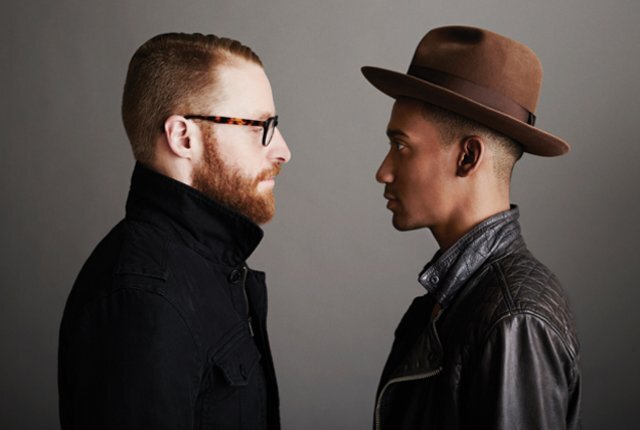The boyfriends’ musical, Invisible Thread, mines their experiences as aid workers in Uganda.
By Brandon Voss
Some couples take relationship goals to a whole other level. Not only have Griffin Matthews and Matt Gould devoted their lives to philanthropy, they’ve also created a musical based on their many years working with young students in Uganda. Directed by Tony winner Diane Paulus, Invisible Thread, in which Matthews stars as a version of himself, opens off-Broadway December 2 at Second Stage Theatre.
The couple shares how they braved one of the world’s most homophobic countries and managed to find beauty there.
Next: How did you first get involved in aid work in Africa?
Griffin Matthews: I always say that I didn’t choose Uganda, Uganda chose me. I’d just graduated from drama school, and I didn’t really know what I wanted to say as an artist. I was going on auditions, waiting tables, coming out, just surviving, and needed an escape for the summer. I got invited to a six-week volunteer trip, and that blossomed into a 10-year mission to help a group of students get educated. It changed the course of my life.
Matt Gould: I was a senior in acting school, hearing about the mass genocides in Bosnia and Rwanda. As a Jewish kid, brought up taught to never forget the Holocaust, I couldn’t believe people were still being slaughtered around the globe. I thought, as an artist, shouldn’t we have something to say about that? The Peace Corps was an easy way at the time to see and learn more of the world.
Uganda has gotten a lot of attention in the media for its homophobic climate and proposed anti-gay legislation like the so-called “Kill the Gays” bill. How has your being a gay couple informed Invisible Thread?
GM: For a long time the themes of sexuality were not even a part of the story. As Uganda attempted to pass its anti-gay bill last year, the show was premiering at American Repertory Theatre near Boston, which, oddly enough, has one of the largest Ugandan populations outside of Uganda. When the bill was introduced, LGBT men and women started fleeing Uganda to seek asylum in Boston, and a lot of them came to see the show and even sat on talkback panels with us. It was then that we realized that maybe we needed to bump up a storyline about Griffin and his Jewish boyfriend.
MG: Any act in support of homosexuality is a political act in Uganda, but we want to create work that’s rooted in love and in the spirit of sharing and education. I hunger to go to the theater and have an experience that shakes me, that wakes me up. We want to move people the way we’ve been moved.
How do you navigate working in Uganda as a gay couple?
GM: Aid work and being an American abroad is complicated. We don’t have the same rights all over the world. All of the kids that we sponsor know we’re gay, but when we go to Uganda, we’re careful, we don’t parade ourselves. You have to stay quiet and stay safe. But politics are not people, and not all Ugandans hate gay people. Some do, yes, but some people hate gay people in America too. We’ve learned that Ugandans are far more advanced in their thinking than we initially gave them credit for.
You live together and work together. How’s that going?
GM: [Laughs] I think the best thing you can do is to create with someone you love. For us, making this show together has made it more personal and satisfying. Artistically, there’s no one I trust more than him.
MG: Likewise. These intense periods actually bring us closer together. Writing a musical, I imagine, is like raising a child. It takes years. You have to be present and available whenever it calls or whines. There are days when it’s awesome and days when it’s challenging. But when we’re in the thick of it, this man is my rock.
GM: The problem is that we could keep working until 3am. So sometimes we do have to call a halt and watch some Say Yes to the Dress.
MG: Say Yes to the Dress: Atlanta.
Next, November 2015.

